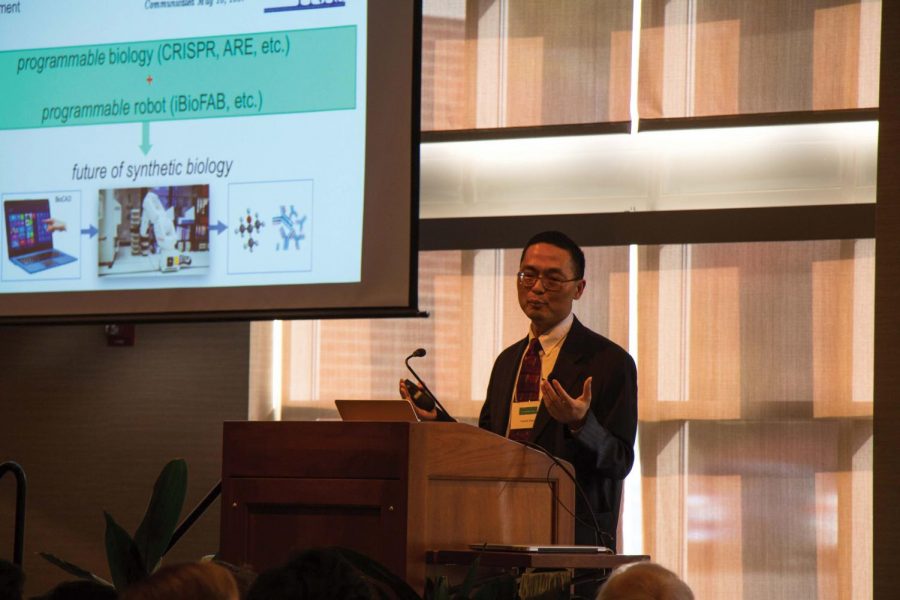Illinois celebrates life sciences through Sol Spiegelman research symposium
Huimin Zhao, professor of Chemical and Biomolecular Engineering, is giving his speech on a new frontier in synthetic biology. Dr. Zhao is also the main host of this symposium that celebrates both U of I Sesquicentennial and 50th anniversary of microbiologist Sol Spiegelman in his work of DNA technology. (Oct. 21, 2017)
Oct 23, 2017
To Huimin Zhao, planning a research symposium seemed the perfect opportunity to show how far biomolecular and synthetic biology research has come in the past 50 years.
Zhao is a professor in the chemical and biomolecular engineering department and is a biosystems theme leader at the Carl R. Woese Institute for Genomic Biology.
He chaired the planning committee for the “Enduring Legacy of Sol Spiegelman” research conference which took place over the weekend.
Sol Spiegelman researched and taught on the University’s faculty for 20 years in the Microbiology Department, from 1949 to 1969, before leaving to direct a new institute at Columbia University. As a pioneer of modern biotechnology and synthetic biology, he made his largest discoveries right here on campus.
The event featured talks from 16 expert scientists, from MIT’s Feng Zhang (one of the discoverers of CRISPR), Frances Arnolds (Zhao’s Ph.D. adviser), to Zhao himself, and also two Nobel Laureates.
Get The Daily Illini in your inbox!
Zhao has long been enthusiastic about the conference and put nearly two years of effort into planning it.
“I’m pleased so many good scientists accepted my speaking invitations, but that goes to show how important Sol Spiegelman’s work is to all of us,” Zhao said. “In a way, Spiegelman was my scientific grandfather because he pioneered my research field.”
Zhao said the symposium came at a unique moment, with IGB celebrating both the University’s sesquicentennial and the 50th anniversary of Spiegelman’s landmark research paper.
“One of Spiegelman’s discoveries involved a technique called directed evolution, which demonstrated that Darwinian evolution could happen in a test tube with cells and their machinery,” Zhao said.
Christopher Rao, a theme leader in the IGB who was also involved with the symposium planning committee, said Spiegelman’s paper was “earth-shattering” for molecular engineering and biotechnology.
“The notion of using evolution in a lab environment was completely new,” Rao said.
Rao said to just look at animal breeding, which uses directed evolution to develop species with artificially selected characteristics.
However, Spiegelman’s most famous experiment produced an entirely unexpected result. “Spiegelman’s Monster” illustrates replication of RNA — cellular information — in a test tube using only cellular machinery that does not need a live cell to direct the process.
The discovery opened the door for questions about producing life entirely within a lab and the possibility that this could occur.
“We still don’t know a lot about biology, but we’re growing closer to getting answers,” Rao said.
Nobel Laureate speakers Jack Szostak and Spiegelman’s former postdoc Richard Axel touched on these questions throughout their talks.
“Normally at scientific meetings, you get detailed talks about scientists’ latest work in their lab, but this symposium featured expansive, big picture talks,” Rao said. “These are the best kind of talks because they link other scientists’ work to each other and show Spiegelman’s direct influence on their research today.”
Yi Lu, a professor of chemistry and conference chair, believes the Spiegelman conference bestows well-deserved recognition for some of the world’s leading scientists and their work. He considered his participation in the event to be a great honor.
Lu was originally scheduled to attend a separate conference in China during the Spiegelman event. However, when he was invited to chair one of the talks, he immediately rearranged his schedule to speak here.
“After two connecting flights from China and a train ride to the University, I was physically tired but spiritually excited for the event,” Lu said.
Students and faculty made up the majority of guests during the three-day conference. Zhao said some students and faculty traveled as far as from the University of Minnesota to attend the event.
“We had a whole group of students from there attending our talks after an eight-hour drive,” Zhao said. “The fact we had so many people attending from all over is a testament to how influential Sol Spiegelman’s work is on the research we’re doing now.”
Zhao also invited Sol Spiegelman’s family to this event. He enjoyed his interactions with Spiegelman’s sons and daughter, especially when they reminisced about campus and living here when they were young.
“It was like a homecoming for them to be on campus after so many years, and they said many nice things about being back here,” Zhao said.
For Zhao, speaking at this event honored Spiegelman as well as other scientists who inspired his own research. He hopes students walked away feeling the same enthusiasm he did after seeing the speakers’ passion for their work.
“In science, things evolve. Things come together to form the perfect storm,” Zhao said. “I hope the new developments in science that our speakers have talked about will inspire our students to become leaders of future generations in these growing scientific fields.”






